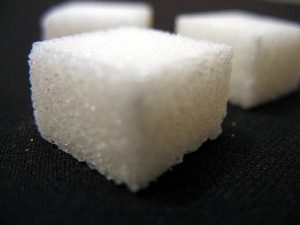 By Andre Evans – Naturalsociety.com
By Andre Evans – Naturalsociety.com
November 15, 2011
How much sugar does the average person consume? How does this affect their health? Increasingly it is being recognized that the substantial level of sugar consumption is responsible for many of the health issues the average person faces, including obesity, diabetes, and chronic lethal afflictions like cancer and heart disease.
Products and diets of today are overloaded on sugar, and its overbearing prevalence manifests in many different forms. Most soft drinks contain either sugar or mercury-filled high fructose corn syrup in copious amounts.
Even so-called “healthy alternatives” are loaded up on sugar in many instances. In fact, the sugar content of the product may deceive you. The average snack product and the majority of fast food products contain grains or starches that break down into sugar when digested. Even more concerning is just how these products are pushed on unsuspecting consumers.
Candy is cunningly advertised to our children, while boasting the largest amounts of sugar. Nearly everywhere you look, a typical consumer-marketed food product contains some amount of sugar. It’s almost impossible to escape it in its myriad of forms, and the conventional artificial sweetener alternatives like aspartame and sucralose are even more unhealthy.
To make matters worse, a growing body of research has found fructose to be as addictive as cocaine.
[ad code=2 align=center]
Most people aren’t even satisfied when they consume these foods. The sweetness of a high sugar content food or drink often provides temporary energy, but no lasting satisfaction or nutritional intake. The body uses a large amount of energy and resources to properly process sugar, and the more you consume, the longer it be exerting this energy. This process may prevent your body from performing optimally, leading you to feel sluggish and tired when consuming sugar-laden foods with no real nutritional substance all day long.
The disturbing aspect is that if nothing changes, the rampant sugar consumption continues, and cumulatively begins bearing down on the wellness of an individual in the form of diseases like diabetes and cancer. Just how much sugar are you consuming on a daily basis? Keep in mind that the recommended amount of sugar to consume on a daily basis is 25g.
- An average bottle of Coke contains over 60g of sugar.
- A Red Bull contains up to 27g of sugar.
- Supposedly healthy Vitamin Water contains up to 13g of sugar.
- An 8oz Snapple contains up to 23g of sugar.
- A single Pop Tart contains 17g of sugar.
- A Cinnabon Cinnamon Roll has up to 55g.
- Most kids cereals, like Capn Crunch, Frosted Flakes and Trix contain anywhere from 10-12g of sugar per serving.
- A 16oz Starbucks Mocha Grande Frappuccino contains over 40g of sugar.
- On average, a pint of ice cream contains up to 80g of sugar, about 20g per serving.
This is just a smidgeon of examples, but knowing that these foods are eaten daily and usually in large quantities illustrates the massive nature of sugar over consumption. It is no surprise that fructose has been noted as the number one source of calories in the average American’s diet. The average person is said to consume 1/3rd of a pound of sugar each day, which equates to over 150g of sugar- six times the recommended 25g.
The fact is that the average diet is absolutely teeming with unsafe quantities of sugar, and as they compound they will undoubtedly lead to disease and sickness. When you are consuming six times what is considered the safe amount of sugar, it cannot possibly end well.
Looking for healthier alternatives will not only help you to alleviate the many negative health effects of sugar over-consumption, but it will also cue you into the fact that a well thought out, nutritional plan will leave you much more satisfied than sugar-loaded processed foods.
Begin to limit your intake of sugar, even if it’s in small steps. Start with one less snack, or substituting a soft drink for water. Add less cream or sugar to your coffee. Replace candy and snacks with more fruits and vegetables. Be aware that even many products being marketed as health-promoting often contain a large amount of sugar. Make sure to check how much sugar is in whatever product you may be purchasing. And in order to keep the sweetness present in your favorite foods, add a little diabetes-crushing Stevia – a natural sweetener that is a great alternative to sugar.

If you've ever found value in our articles, we'd greatly appreciate your support by purchasing Mindful Meditation Techniques for Kids - A Practical Guide for Adults to Empower Kids with the Gift of Inner Peace and Resilience for Life.
In the spirit of mindfulness, we encourage you to choose the paperback version. Delve into its pages away from screen glare and notifications, allowing yourself to fully immerse in the transformative practices within. The physical book enriches the learning process and serves as a tangible commitment to mindfulness, easily shared among family and friends.
Over the past few years, Wake Up World has faced significant online censorship, impacting our financial ability to stay online. Instead of soliciting donations, we're exploring win-win solutions with our readers to remain financially viable. Moving into book publishing, we hope to secure ongoing funds to continue our mission. With over 8,500 articles published in the past 13 years, we are committed to keeping our content free and accessible to everyone, without resorting to a paywall.






